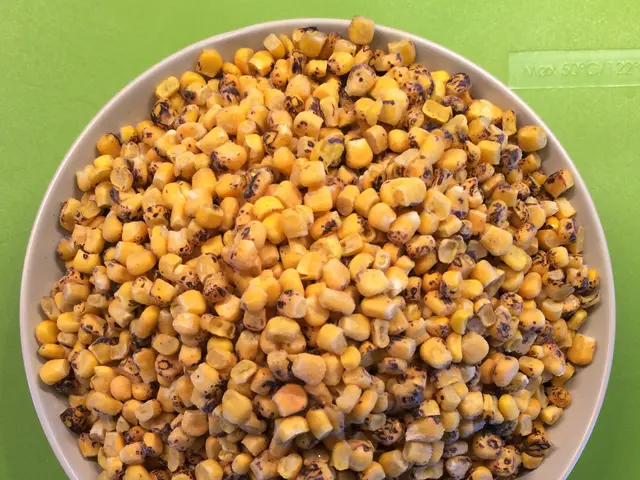Top Dietary Picks for ADHD Management: explored nutritional options for optimizing ADHD treatment.
A Fresh Take on the ADHD Diet and What Foods to Incorporate
Looking to optimize your brain health and manage ADHD or ADD symptoms? Follow these dietary guidelines to fuel your brain with essential nutrients:
A Balanced Diet: The Foundation of an effective ADHD diet
Keeping a well-balanced diet is vital for maintaining a healthy brain and bolstering cognitive function. For individuals with ADHD or ADD, a nutritious diet can significantly alleviate symptoms and improve focus. Here's a breakdown of what to include in your meal plan:
Foods for an Improved ADHD Diet
- Protein-Packed Meals: Consume protein at every meal to regulate blood sugar levels and boost focus. Opt for sources like:
- Legumes: High in fiber and sustained energy
- Lean meats: Choose chicken, turkey, or fish for a nutritious protein option
- Eggs: Easy to incorporate into meals for added protein
- Cheese: Packed with calcium and protein
- Nuts and Nut Butters: Ideal for healthy fats and protein
- Seafood: Rich in omega-3 fatty acids that support brain function
- Complex Carbohydrates: Embrace whole grains, fruits, and vegetables for steady blood sugar levels and essential nutrients.
- Fiber-Rich Options: Regulate digestion and provide sustained energy with foods like oats, fruits, and veggies.
- Healthy Fats:
- Fish: Packed with omega-3 fatty acids, beneficial for brain function
- Olive Oil: Rich in heart-healthy fats that support overall wellness
- Micronutrient-Rich Foods: Fill your diet with foods high in vitamins and minerals like magnesium, zinc, and B vitamins—all crucial for brain function.
- Low-Carb and Ketogenic Diets: Some research indicates that diets inducing ketosis could improve focus and minimize symptoms by offering an alternative energy source for the brain [1][2].
Including these foods as part of your diet can help manage ADHD symptoms naturally. Keep in mind that a balanced diet and personalized advice from a healthcare professional or nutritionist are essential.
A Word on Foods to Avoid
While specific foods can benefit symptoms of ADHD and ADD, there are also options to curb or avoid altogether. Be mindful of the following foods:
- High-Sugar Foods: Overly sweet snacks and beverages can trigger spikes and crashes in blood sugar levels, negatively impacting focus and attention.
- Refined Carbohydrates: Limit intake of simple carbs found in white bread, sugary cereals, and pastries, as they may disrupt cognitive function.
- Unhealthy Fats:CURB your consumption of trans and saturated fats found in processed snacks, fast food, and fried food, as they can harm brain health and cognitive function.
- Caffeine: In MODERATION, small amounts of caffeine can enhance focus; however, excessive consumption may lead to agitation, sleep disruptions, and anxiety.
The Bottom Line: A Growth-Promoting Diet for everyone
Whether you battle with ADHD or simply want to boost brain health, an ADHD diet can be a game-changer. Focusing on a diet rich in nutrient-dense foods will provide the brain the fuel it needs to function optimally.
Remember, a balanced diet—including a variety of fruits, vegetables, whole grains, lean proteins, and healthy fats—is key. Don't forget to stay hydrated and limit sugary, processed foods for a healthy and thriving brain.
So, whether you're knee-deep in ADHD or just looking to supercharge your brainpower, embrace an ADHD diet as the natural approach to optimizing your cognitive function and overall well-being. Start making positive changes today and witness long-term benefits from a wholesome diet.
Source:[1] BeckyTotalHealth.com. "Foods for ADHD." BeckyTotalHealth.com, Becky Johnson-Lee, 13 Dec. 2019, https://beckytotalhealth.com/foods-for-adhd/.[2] ADDitude.com. "20 Best Foods for ADHD." ADDitude, Eleanor Beaton, 11 June 2019, https://www.additudemag.com/adhd-diet-best-foods-video/.[3] Healthline.com. "The Best Foods for ADHD." Healthline, MemorialCare.org (Mission Hospital), 7 Aug. 2020, https://www.healthline.com/nutrition/best-foods-for-adhd.[4] Mercola.com. "The Ketogenic Diet for ADHD: Does It Work?" Mercola.com, Dr. Joseph Mercola, 9 Jan. 2019, https://articles.mercola.com/sites/articles/archive/2019/01/09/ketogenic-diet-adhd.aspx.
- To optimize brain health and potentially manage ADHD or ADD symptoms, consider incorporating protein-packed meals such as lean meats, eggs, cheese, nuts, seafood, and healthy fats like olive oil into your diet.
- Adopt a balanced diet rich in complex carbohydrates like whole grains, fruits, and vegetables, as well as fiber-rich options, to maintain steady blood sugar levels and essential nutrients for the brain.
- Embrace science-backed dietary approaches, such as low-carb and ketogenic diets, to improve focus and minimize symptoms by offering an alternative energy source for the brain.
- Part of an effective ADHD diet includes avoiding foods that negatively impact focus and attention, such as high-sugar foods, refined carbohydrates, unhealthy fats, and excessive caffeine consumption.
- Adopting a healthy-cooking lifestyle focused on food-and-drink choices aligned with the principles of the ADHD diet can lead to better brain development, mental health, and overall health-and-wellness, and contribute to improved fitness-and-exercise performance.








